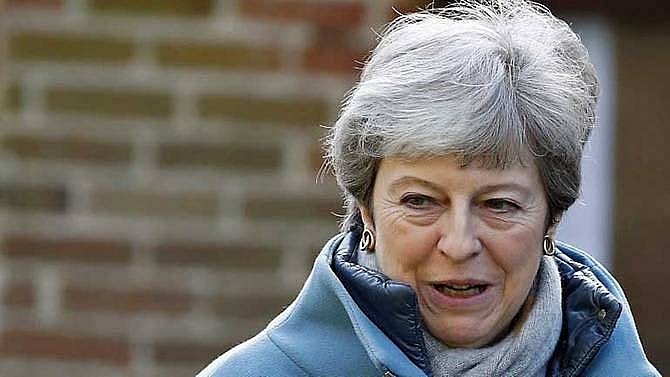Under threat May holds Brexit crisis talks
 |
| Britain's Prime Minister Theresa May leaves after attending a church service, near her Maidenhead constituency, west of London. (Adrian DENNIS/AFP) |
Ensconced at her country residence Chequers, the embattled premier met with Tory Brexiteer MPs, including the influential Jacob Rees-Mogg and former foreign secretary Boris Johnson - widely seen as wanting to replace her.
May must decide when, or even if, to ask lawmakers to vote again on her unpopular EU divorce deal which they have already overwhelmingly rejected twice.
After a particularly chaotic week even for May's crisis-plagued tenure - during which she made an ill-judged attack on MPs' intransigence on her plan - speculation is rife that Conservatives are preparing to force her to resign.
The Sunday Times reported she was "at the mercy of a full-blown cabinet coup", with plans afoot for her de facto deputy David Lidington to take over in a caretaker capacity.
The newspaper said it had spoken to 11 senior ministers who "confirmed that they wanted the prime minister to make way for someone else" and planned to confront her at a cabinet meeting on Monday.
Such gatherings usually take place on Tuesdays but Downing Street confirmed one was scheduled for 10.00am (6.00pm Singapore time) on Monday.
The Mail on Sunday said May could be ousted "within days" and Environment Secretary Michael Gove, a prominent Brexiteer, could take over as interim leader.
Both Gove and Lidington have denied any desire to take over the leadership.
"It's not the time to change the captain of the ship," said Gove.
Finance Minister Philip Hammond on Sunday criticised the plotters, arguing it would be "self-indulgent" to try to switch leader.
"Changing the players doesn't solve the problem," he told Sky News. "We've got to resolve this issue."
A Downing Street statement described the Chequers meetings as "lengthy talks with senior colleagues about delivering Brexit".
UNCERTAINTY REIGNS
May is also confronted with the prospect of lawmakers seizing control of House of Commons procedures in order to hold a series of so-called "indicative votes" to reveal what support exists for other options on Brexit.
It follows May securing at a European Union summit this week a delay to Britain's scheduled Mar 29 departure for at least three weeks to get her agreement approved or find a viable alternative.
Britain's parliament, and cabinet, has been deadlocked for months over Brexit, with lawmakers unable to decide how to implement the 2016 referendum vote to leave, reflecting bitter divisions nationwide.
On Saturday, organisers estimated one million pro-Europeans marched through central London demanding another public vote on leaving the bloc.
Following the agreement with the EU to postpone Brexit - which MPs must still vote into British law next week - the path forward still remains highly uncertain.
If May's deal finally wins MPs' backing Britain will leave the EU on May 22 under the terms she struck with the bloc last year.
If it is not passed in the coming weeks London must outline a new plan or face a no-deal Brexit as early as Apr 12.
A request then for another, likely lengthy, extension would require holding European Parliament elections in May.
The prime minister and Brexiteers have decried the prospect, saying it would be unfair to the narrow majority of Britons who voted to leave the bloc in 2016.
'ALTERNATIVE WAY'
May has told MPs she will only bring back her deal for another vote if there are signs of "sufficient support".
But with her parliamentary allies the Democratic Unionist Party indicating on Friday that they remain opposed to her plan, that appears unlikely.
"It's looking very difficult to bring together a majority for it," Hammond conceded to the BBC.
However, "one way or another parliament is going to have the opportunity this week to decide what it is in favour of," he added.
MPs will resume debate on Brexit on Monday and have the chance to vote on an amendment tabled by a cross-party group of senior lawmakers scheduling "indicative votes" two days later.
A similar move earlier this month failed by just two votes.
If passed, lawmakers will be able to vote on a range of options, from stopping Brexit altogether or holding a second referendum to remaining in a customs union with the EU or its single market.
MPs could then try to turn their non-binding votes into enforceable law.
Brexit Secretary Steve Barclay warned on Sunday such a move could spark a constitutional crisis and that "the risk of a general election increases" under such a scenario.
"There is a constitutional collision if parliament is instructing a government to do something that is fundamentally against what it has been elected to do," he told the BBC.
What the stars mean:
★ Poor ★ ★ Promising ★★★ Good ★★★★ Very good ★★★★★ Exceptional
 Tag:
Tag:
Related Contents
Latest News
More News
- Russian President congratulates Vietnamese Party leader during phone talks (January 25, 2026 | 09:58)
- Worldwide congratulations underscore confidence in Vietnam’s 14th Party Congress (January 23, 2026 | 09:02)
- Political parties, organisations, int’l friends send congratulations to 14th National Party Congress (January 22, 2026 | 09:33)
- 14th National Party Congress: Japanese media highlight Vietnam’s growth targets (January 21, 2026 | 09:46)
- 14th National Party Congress: Driving force for Vietnam to continue renewal, innovation, breakthroughs (January 21, 2026 | 09:42)
- Vietnam remains spiritual support for progressive forces: Colombian party leader (January 21, 2026 | 08:00)
- Int'l media provides large coverage of 14th National Party Congress's first working day (January 20, 2026 | 09:09)
- Vietnamese firms win top honours at ASEAN Digital Awards (January 16, 2026 | 16:45)
- ASEAN Digital Ministers' Meeting opens in Hanoi (January 15, 2026 | 15:33)
- ASEAN economies move up the global chip value chain (December 09, 2025 | 13:32)






















 Mobile Version
Mobile Version